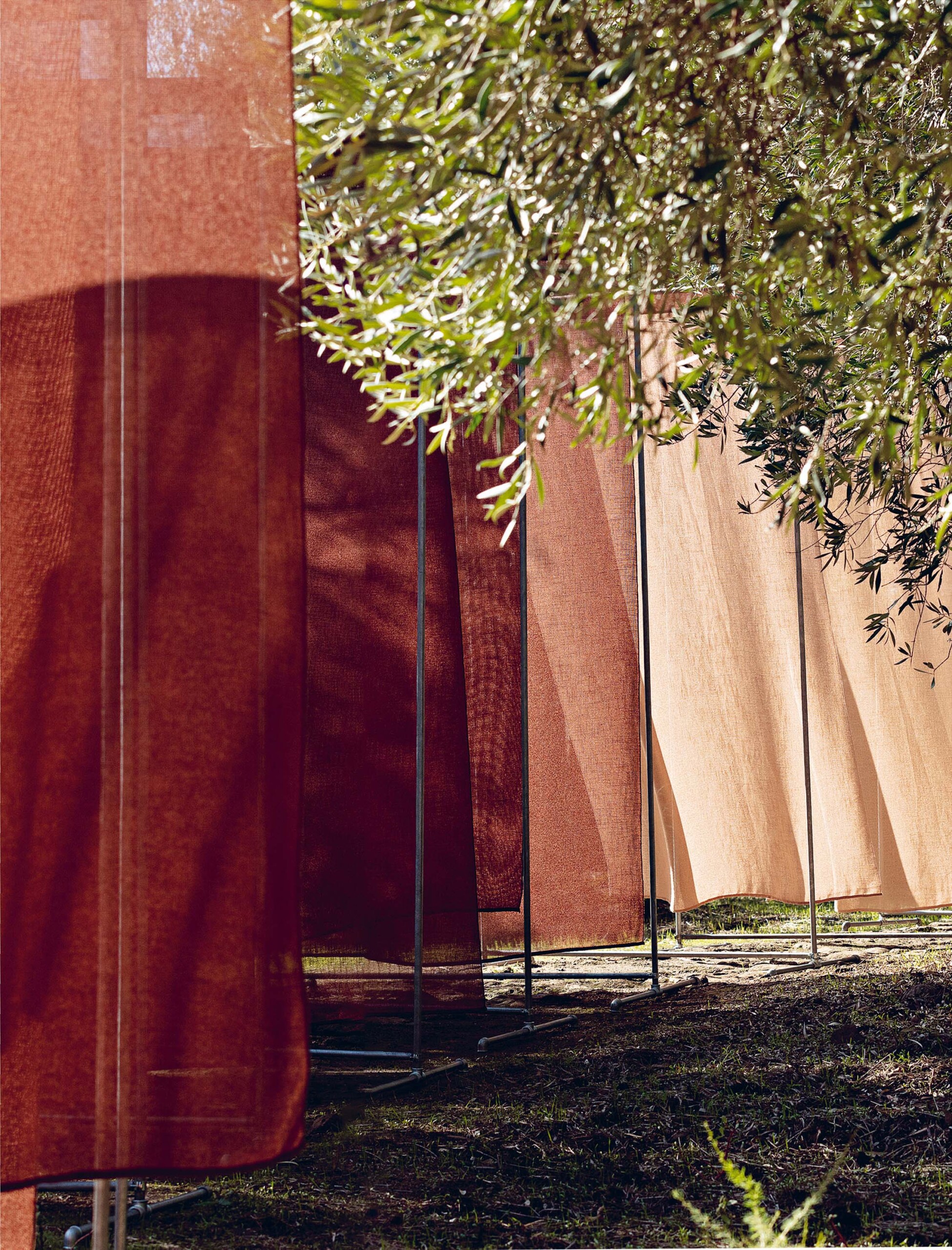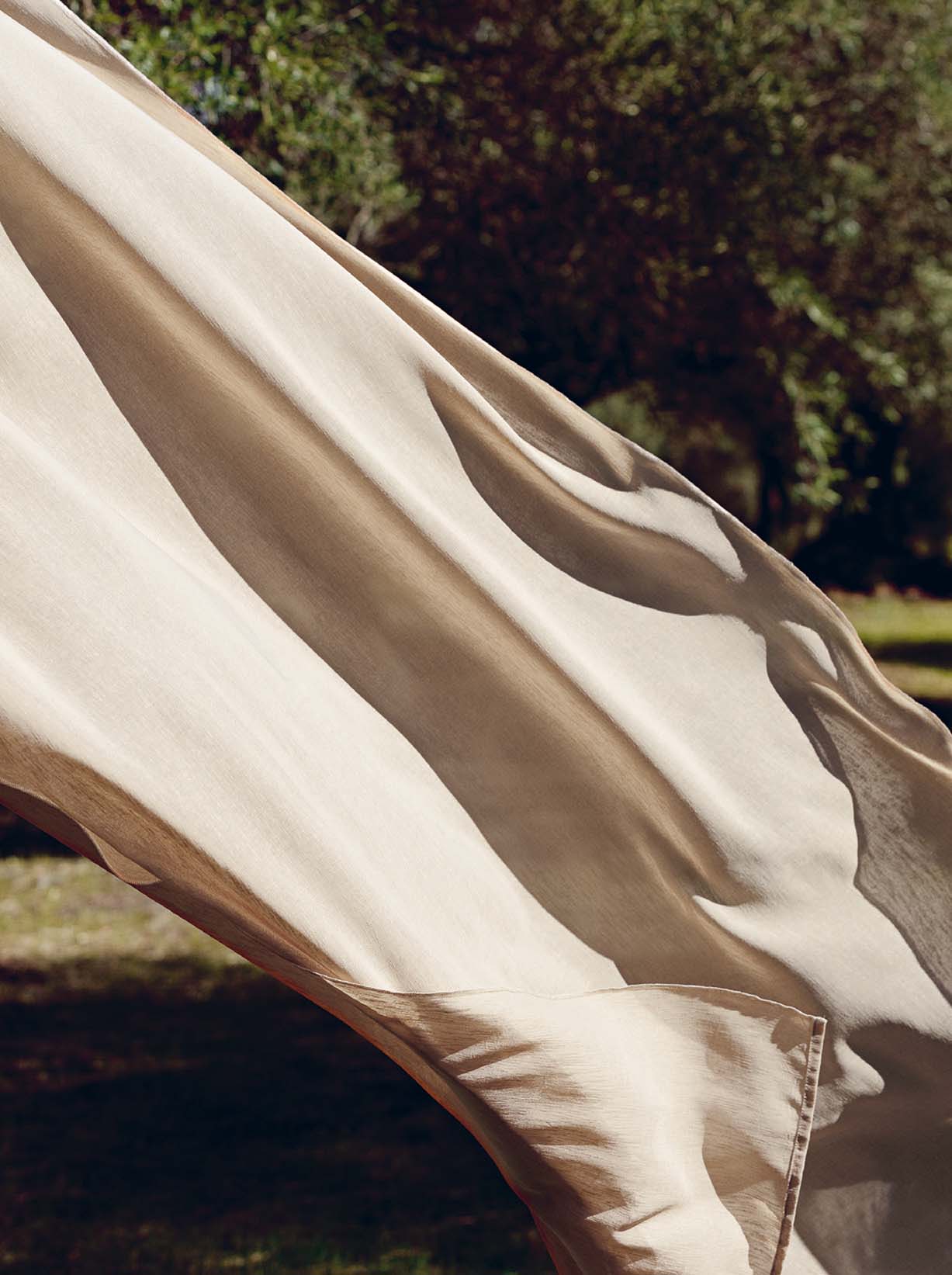Making Recycling sexy
Camilla D. Fischbacher about her fight for BENU® Recycled, the fabric collection that completely changed the traditional Swiss textile editor, Fischbacher 1819—and the textile industry as a whole.


1 — The BENU Recycling Collection was launched in 2009 and has been continuously refined. Now in its fifth collection, it showcases the diversity and beauty of recycled materials.
2 — Gone with the wind? Not really, recycling is truly part of the Fischbacher 1819 DNA.
How far ahead of public taste, of the market, is it possible to go without failing? The BENU® Recycled collection has certainly proved your ability to play the long game. Few companies would have had so much stamina.
Camilla D. Fischbacher
We were the first in our industry to tackle this challenge. If I’d known it would take so long to create a sustainable product that met our hallmark quality standards, I would have hesitated about starting the process at all. But my gut feeling told me it would work. BENU® Recycled has changed the whole company. It just felt right. Unfortunately, one of our first US manufacturers was forced to close shortly after we launched the collection, so we had the products but couldn’t order any more.
-
Sounds like quite a blow.
Camilla D. Fischbacher
It certainly was. But the first BENU® Recycled collection didn’t sell well, so we didn’t need to produce more for a long time. It was shaping up to be a flop. Then, by a stroke of luck, the buyer from the Motel One chain saw our BENU display in the Munich showroom and was immediately struck by the concept. She eventually decided against
it—but only because BENU couldn’t be produced in a flame-retardant version at the time. It was pure polyester, made from PET bottles. But her input gave us the impetus to continue working on development and launch an innovative and sustainable product.
-
Has the public perception image of Fischbacher 1819 changed as a result?
Camilla D. Fischbacher
Yes, I think today we have a reputation as one of the most innovative textile creators on the market. A long company history has its advantages. We weren’t a startup and could afford to play the long game, so every year our creative team and I worked on new BENU® Recycled fabrics and expanded the collection. But not even that was free from conflict. In the first years of BENU, a member of the executive board took me to one side, pointed to the recycled fabrics and said, word for word, “I don’t think you really understand, but we are an elegant company, and this trash really isn’t a good fit. Please stop pushing it.”
-
How did that make you feel?
Camilla D. Fischbacher
I said to myself: OK then, I’ll show you what recycling is and prove to you that it can be elegant! We launched BENU Talent, a real all-round fabric. It’s a velvet furnishing and curtain fabric that is simple, but stylish. It richly deserves its name; the pile is made from 100 per cent recycled PET and the fabric is flame-retardant and also suitable for outdoor applications and the property sector. It took four years, and it was only stubbornness that pushed it to success. Its development was very challenging for our suppliers; they were close to giving up on many occasions because they realised they would have to rework their entire production processes to produce the fabric we were seeking. There were constant problems over material purity—particularly in the white colourway, because a single blue bottle in the raw material was enough to ruin a whole production run. That’s the kind of thing you only find out when production is under way. I had to work so hard to convince people and keep them on side. Today, we’re all delighted we stuck with it.
-
What was the turning-point?
Camilla D. Fischbacher
When we won the Red Dot Design Award, the company’s first ever, and later a Swiss Design Award for BENU Sea. It suddenly kick-started a dynamic, and we knew BENU would turn into something big.
-
Quite a risk.
Camilla D. Fischbacher
But so worthwhile. The BENU® Recycled Collection changed the entire company—our visual language, the way we photograph fabrics, right down to our own perception of who we are and what we stand for. In the beginning, BENU wasn’t even allowed on our main website, but was banished to a dedicated microsite. Today the BENU® Recycled Collection is one of our company’s calling cards. And it feels great when we’re the first port of call for manufacturers seeking to develop something new in the field of sustainability. You simply need to believe in something and persevere.
-
And yet we’re only now taking the path towards circular production.
Camilla D. Fischbacher
Exactly. We’re just not there yet. Even we only have one fabric from the BENU Collection that can be wholly returned to the production cycle (BENU Yarn). Nevertheless, we’re determined to carry on. And with every step, with every year, we’re building something new, growing our portfolio of sustainable fabrics and working with our partners on developing not only recycled fabrics, but fully circular products. With our first collections, it was so hard to create a fabric that looked good. Today, BENU fabrics are the equal of non-recycled fabrics in terms of aesthetics, handle and functionality.
-
So what are manufacturers doing now that’s so different?
Camilla D. Fischbacher
Manufacturers need to be willing to buy up tonnes of recycled yarns in order to create new products from them. That’s what they’re doing today, along with investing in better recycled yarns. And they’re continuing to experiment with the aim of producing more attractive, more functional fabrics.
-
In the beginning, flame-retardance was a deal-breaker. What have the manufacturers changed since then?
Camilla D. Fischbacher
They’re using different compositions for polyester to enable it to be produced from mono-materials.
-
That sounds like the great transformation that is confronting many industries. What does it take, apart from staying power?
Camilla D. Fischbacher
Passion. Our own designers didn’t exactly jump for joy in the beginning, because the fabrics that were shown to us were really ugly. So I told them, “Right, your task is to transform these fabrics into something beautiful and desirable. We need to make recycling sexy!” And they did.
-
Please select an offer and read the Complete Article Issue No 16 Subscriptions
Already Customer? Please login.